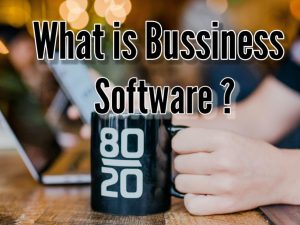Business Software: A Comprehensive Guide
Business software is an extensive category that encompasses a diverse array of applications aimed at enhancing the efficiency and effectiveness of businesses of all scales. From fundamental accounting and word processing programs to intricate enterprise resource planning (ERP) systems, business software holds immense significance in today’s fiercely competitive market.
Within this all-inclusive guide, we will delve into the various classifications of business software that are accessible, elucidate the advantages of utilizing such software, and offer valuable insights for choosing the most suitable software for your specific business requirements.

What is Business Software?
Business software is any software application that is designed to help businesses of all sizes operate more efficiently and effectively. This includes a wide range of applications, from basic accounting and word processing programs to complex enterprise resource planning (ERP) systems.
Business software has the capability to streamline numerous tasks that would otherwise require manual effort, including data entry, customer relationship management (CRM), and project management. By automating these processes, employees are able to allocate their time and energy towards more strategic endeavors, such as sales and marketing.
Types of Business Software
Numerous business software options are accessible, each tailored to cater to a particular requirement or task. Among the most prevalent business software types are:
- Accounting software: This software is used to track income and expenses, generate financial reports, and prepare tax returns.
- Customer relationship management (CRM) software: This software is used to track interactions with customers, manage sales leads, and provide customer service.
- Enterprise resource planning (ERP) software: This software is used to integrate all aspects of a business, such as accounting, finance, supply chain management, and manufacturing.
- Project management software: This software is used to plan, schedule, and track projects.
- Productivity software: This software includes applications such as word processing, spreadsheets, and presentation software.
- Security software: This software is used to protect computers and networks from viruses, malware, and other threats.
Benefits of Using Business Software
There are many benefits to using business software, including:
- Increased efficiency: Business software can automate many tasks that would otherwise be done manually, freeing up employees to focus on more strategic tasks.
- Improved accuracy: Business software can help to reduce errors and improve the accuracy of data.
- Enhanced collaboration: Business software can facilitate communication and collaboration between employees.
- Greater insight: Business software can provide valuable insights into business operations, which can help businesses make better decisions.
- Reduced costs: Business software can help businesses to save money by automating tasks, improving efficiency, and reducing errors.
How to Select the Right Business Software
When selecting business software, it is important to consider the following factors:
- Business needs: What are the specific needs of your business? What tasks do you need to automate? What information do you need to track?
- Budget: How much can you afford to spend on business software?
- Ease of use: How simple is it to learn and operate the software?
- Scalability: Will the software be able to grow with your business?
- Support: What kind of support does the vendor offer?
It is also important to consider the specific features of each software application. Some features to look for include:
- Integration with other software: Can the software integrate with other software applications that you use?
- Mobile compatibility: Can the software be accessed from mobile devices?
- Cloud-based or on-premises: Do you want a cloud-based solution or an on-premises solution?
Conclusion
Business software is an invaluable asset for enterprises of any magnitude. By streamlining operations, enhancing productivity, and offering valuable insights, business software empowers organizations to function more efficiently and accomplish their objectives.
When selecting business software, it is important to consider the specific needs of your business, your budget, and the features of each software application. With careful planning and selection, you can choose the right business software to help your business succeed.